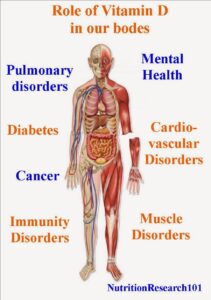Levels of Vitamin D affect your mood, energy, and immune function.
As summer comes to an end so do our days of sunshine and Vitamin D up here in Minnesota. But no longer are the days where bone health is the only focus for vitamin D.
Do you ever feel sad, un-motived, or unable to enjoy the things you love for weeks or months? Depression and mood disorders have many different causes, but one place to look is at your vitamin D, or lack there of.
It is estimated that 1 billion people worldwide are deficient in vitamin D. Rates of deficiency in the US are on the rise. An NHANES study showed that about 40% of Americans have a subclinical deficiency and 30% are deficient. Only about 20% of Americans have sufficient vitamin D levels.

The skin is able to convert ultraviolet rays into vitamin D, but we cannot produce enough vitamin D from sunlight at latitudes above 42 degrees N most of the year. Minnesota is at 46 degrees N latitude. I’m sure you can do the math. This is especially important because it is not commonly found in foods. There are 2 forms of vitamin D in our diet – D2 (ergocalciferol) is in plant sources (mushrooms treated with UV, fortified cereals) and D3 (cholecalciferol) from animal products (fatty fish, eggs from chickens fed vitamin D).
Lack of sunlight exposure, over 65 years old, dark skin, certain medications, obesity, sedentary lifestyle, and a baby exclusively breastfed without vitamin D supplementation can increase your risk for D deficiency.
Signs your Vitamin D might be low:
- Depression
- Throbbing bone pain – symmetric lower back pain, pelvis, legs
- Muscle aches
- Muscle weakness
- Chronic fatigue
- Depression
- Chronic fatigue syndrome
- Fibromyalgia
- Pain with pressure over sternum or tibia
- Headaches
- Fatigue
How does vitamin D affect my body?
Vitamin D has a clear association with bone density, but there are numerous other disease processes that are affected by vitamin D. Studies show a relationship between D deficiency and autoimmune conditions like type 1 diabetes, multiple sclerosis, and rheumatoid arthritis. Cancer (colon, breast, prostate, and pancreatic), high blood pressure, coronary artery disease, obesity, type 2 diabetes, and neurodegenerative disorders are also linked with D deficiency just to name a few. [2] Part 3 will cover the immune system in more detail.
Does vitamin D affect my mood?
Your mood can also be impacted by your vitamin D status. More research is needed to better understand how, but studies have revealed that low vitamin D levels are more prominent in those with depression. [3]
Another study showed an improvement in scores on the Becks Depression Inventory II, 3 months after high dose vitamin D treatment compared to those without vitamin D treatment. [4] This indicates that vitamin D can be helpful for those with depression.
Those suffering from fibromyalgia often have symptoms of anxiety and depression. One study looked at vitamin D levels in those with fibromyalgia and how it is connected to depression and anxiety. They found that patients with vitamin D deficiency scored higher on Hospital Anxiety and Depression Score (HADS). However, they did not notice a relationship between vitamin D status and musculoskeletal symptoms of the disease. [5] So while vitamin D may not reduce the pain associated with fibromyalgia, it can improve your mood.

Mood disorders and vitamin D were reviewed by the Journal of Midwifery Womens Health. They found that premenstrual syndrome (PMS), seasonal affective disorder, non-specified mood disorder, and major depressive disorder in women were associated with low levels of vitamin D in various studies. [6] Researchers looked at 6 women with low levels of vitamin D. They were evaluated with the Beck Depression Inventory (BDI) before and after vitamin D supplementation. Their levels of vitamin D increased while their BDI scores decreased significantly by an average of 10 points. While this was a small population, it showed that vitamin D can reduce symptoms of depression in females with low vitamin D levels.
There seems to be a clear association between vitamin D and mood disorders, especially in those who are deficient. When was the last time your vitamin D was tested? I frequently recommend a simple blood test for patients to evaluate their vitamin D status. This is important to establish a safe dosage of vitamin D. Vitamin D is fat soluble; therefore high doses are not needed long-term and can become harmful if taken too long. There are many health benefits to take vitamin D, but it is important to consult with a qualified health professional whenever beginning a new supplement regimen.

As a Naturopathic Doctor in the Twin Cities (Edina and Woodbury), I frequently test blood levels of Vitamin D. Call or schedule online if you are interested in testing your vitamin D levels and to better understand an appropriate protocol for your health.
References:
- Priemel M., von Domarus C., Klatte T.O., et al: Bone mineralization defects and vitamin D deficiency: histomorphometric analysis of iliac crest bone biopsies and circulating 25-hydroxyvitamin D in 675 patients. Journal of Bone and Mineral Research305-312.2010;
- Cianferotti, L., Marcocci C.: Subclinical Vitamin D Deficiency. Best Practice & Research Clinical Endocrinology & Metabolism. V 26, issue 4. 2012.
- Vitamin D deficiency and depression in adults: systematic review and meta-analysis. Anglin RE – Br J Psychiatry – 01-FEB-2013; 202: 100-7
- The effect of 2 different single injections of high dose of vitamin D on improving the depression in depressed patients with vitamin D deficiency: a randomized clinical trial. Mozaffari-Khosravi H – J Clin Psychopharmacol – 01-JUN-2013; 33(3): 378-85
- Vitamin D deficiency is associated with anxiety and depression in fibromyalgia. Armstrong DJ – Clin Rheumatol – 01-APR-2007; 26(4): 551-4
- Vitamin D and mood disorders among women: an integrative review. Murphy PK – J Midwifery Womens Health – 01-SEP-2008; 53(5): 440-6

